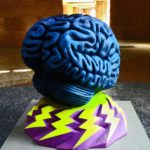How to Super-learn: Tricking Your Brain
Super Learning Strategies
In a post on my other website, I discussed how our brains are still hard-wired to the caveman era and survival responses. And while this can be a pain in the proverbial fur pelt, we can use this knowledge to help ourselves learn more quickly and to develop training presentations that will be remembered.
Our survival instincts are powerful enough that we learn fairly rapidly in life to stay away from danger and to seek sanctuary, bonding and community. And this means that things that our brains are primed to stay alert to are shock and novelty to avoid compromising situations such as being eaten by a tiger.
We also naturally pay attention to human things, such as faces, characters and stories, which were important to us back in the cave. Things that cause us emotional stirring and things that cause us to think deeply and solve problems are more likely to stick in our minds.
So to help yourself to learn and to make your notes really stick in your mind, what could you do?
Making up a story or even a song out of your notes is a great way of making information stick. If you can find a way of presenting a role play that isn’t unbearable, then that’s a great way to make information stay in your brain too.
An added advantage of this is that that most people learn better when they involve some movement in their learning. Demonstrating something yourself wires it in the brain much faster than if you are just shown or told or you read how to do it.
The more of your neurological systems you involve in learning, the better. Cavemen were dynamic learners – they learnt on their feet.
If you can’t demonstrate, then use visualisation to imagine demonstrating– mental rehearsal is a powerful tool. And draw pictures and mind-maps and patterns.
Familiarity is also something we learned to prize a long time ago, so familiar images, sounds and sensations can all act as an aide-memoire when you link them to the information you’re learning.
And one last tip, give your poor brain some time to process the information before overloading it with something else. Take a nap or a walk to give your brain a chance to encode your memories.
https://www.wiseism.com/learning-by-brain-tricks/https://www.wiseism.com/wp-content/uploads/learning.jpghttps://www.wiseism.com/wp-content/uploads/learning-150x150.jpgWise MindWise Workbrain tricks,brainpower,careers advice,learning,thoughtSuper Learning Strategies In a post on my other website, I discussed how our brains are still hard-wired to the caveman era and survival responses. And while this can be a pain in the proverbial fur pelt, we can use this knowledge to help ourselves learn more quickly and to...The WiseistBeth Burgesswiseism1@gmail.comAdministratorMy name is Beth Burgess. I don't claim to be the wisest, but I am 'The Wiseist' - someone dedicated to collecting and sharing wisdom that can help people live their lives more happily and successfully. I'm also the bestselling author of "Instant Wisdom: 10 Easy Ways to Get Smart Fast",, a therapist, coach, freelance writer, speaker, trainer, and workshop leader. And I'm still learning too.Wiseism







Leave a Reply
You must be logged in to post a comment.